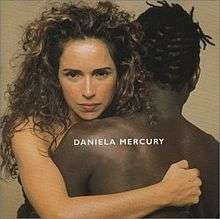Feijão com Arroz
| Feijão com Arroz | ||||
|---|---|---|---|---|
 | ||||
| Studio album by Daniela Mercury | ||||
| Released |
1996 January 14, 1997 (North America/Europe) | |||
| Genre | Axé, MPB | |||
| Length | 54:30 | |||
| Label | Epic (Sony Music) | |||
| Producer | Alfredo Moura, Rildo Hora | |||
| Daniela Mercury chronology | ||||
| ||||
| Singles from Feijão com Arroz | ||||
|
||||
| Professional ratings | |
|---|---|
| Review scores | |
| Source | Rating |
| Allmusic | |
Feijão com Arroz (Portuguese for Rice and beans) is the fourth studio album by Daniela Mercury, released in 1996 in Brazil and on January 14, 1997 in North America and Europe through Sony Music.
Feijão com Arroz was the second best-selling album of Mercury's career, and which produced more hit songs in Brazilian radios, only behind O Canto da Cidade (1992). The first single was "À Primeira Vista", written by Chico César, the song went to #1 on Brazilian chart. The song was also included on the soundtrack of the soap opera O Rei do Gado (The King of Cattle), and became the most successful of the singer's career since O Canto da Cidade. The other album hit singles were "Nobre Vagabundo", "Rapunzel" (both number-one hits), "Minas com Bahia" (top-twenty hit) and "Feijão de Corda" (a top-ten hit). In addition to her success in Brazil, Feijão com Arroz became one of the best selling albums ever in Portugal, opening the door of the music market in the country for the singer; the album sold close to 250,000 copies in the Portuguese market, accumulating more than six platinum (a platinum record is equivalent to the sale of at least 40.000 copies). Feijão com Arroz made Daniela Mercury one of the most popular Brazilian artists ever in Portugal. This album also achieved minor success in a few European countries, such as France and Germany.
Background
The album, which was produced by Alfredo Moura (except for the track "Vide Gal", produced by Rildo Time), sold almost two million copies in Brazil, receiving a diamond disc certification of the Brazilian Association of Record Producers. It was the third and so far last album of Mercury's career to receive a diamond disc.
The album's success was not limited to the public. It was very well received by critics, being considered as her best album, according to the evaluation of the All Music Guide. Daniela said about the album:
It's a very complex record. You can see it when I sing his songs live. There are many instruments of different percussion, and to transpose it to the stage takes a certain job. When we recorded, we got to stay three days mixing a single song. I think the record confirms the serious research I've been doing about everything I learned over the years with Carnival, with the electric trio, with regional northeastern rhythms. I have put everything on it, in terms of great quality.
Artwork
On the cover of Feijão com arroz, photographed by Mario Cravo Neto, Daniela embraces a black model. The singer said that the photo epitomizes her work, "I am a white singer in the world of african blocks". A poll conducted by the Globo newspaper website, chose the album cover as the best in the history of Brazilian music, beating Tropicália, Secos e Molhados (Dry and Wet) and Cabeça de Dinossauro (Head Dinosaur) covers.
Track listing
| No. | Title | Writer(s) | Length |
|---|---|---|---|
| 1. | "Nobre Vagabundo" | Márcio Mello | |
| 2. | "Rapunzel" | Alaim Tavares, Carlinhos Brown | |
| 3. | "Minas com Bahia" (featuring Samuel Rosa) | Chico Amaral | |
| 4. | "Feijão de Corda" (featuring Banda Bragadá) | Ramon Cruz | |
| 5. | "Você Abusou" | Antônio Carlos e Jocáfi | |
| 6. | "Dona Canô" | Neguinho do Samba | |
| 7. | "Bate Couro" | Tavares, Gilson Babilonia | |
| 8. | "À Primeira Vista" | Chico César | |
| 9. | "Rede" | Tavares, Babilonia | |
| 10. | "Musa Calabar" | Guiguio | |
| 11. | "Vai Chover" | Gustavo de Dalva, Boghan Costa | |
| 12. | "Vestido de Chita" | Ivan Huol, Mercury | |
| 13. | "Do Carinho" | Dalva, Costa | |
| 14. | "Bandeira Flor" | Mello | |
| 15. | "Vide Gal" | Brown | |
| 16. | "Usted Abusó (Você Abusou)" (International Bonus Track) | Antônio Carlos e Jocáfi | |
| 17. | "Ue Wo Muite Aruko (Sukiyaki)" (International Bonus Track) | Traditional |
Awards
| Year | Award | Category |
|---|---|---|
| 1997 | Prêmio Multishow de Música Brasileira | Best female singer |
| Video Music Brasil | Best music video cinematography - "Nobre Vagabundo" | |